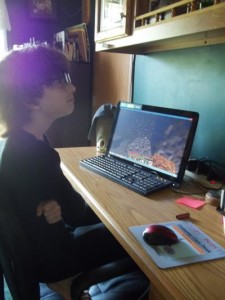Montessori: Child Refusing Presentations
Yep. It happens. Children refuse presentations. Some children even get angry about it.
And age doesn’t matter.
The factors remain the same – there is a mis-match between the invitation and the child.

The computer in the photo is part of the joke. He was playing Minecraft as part of an appropriate time usage of the computer and couldn’t stop smiling while posing as if he was refusing a presentation. He finds this post riotously hilarious.
- the child is not prepared – tired, confused, bored, over-stimulated, under-stimulated
- the adult read/observed the child’s readiness
- the adult did not prepare the environment or provide allowances for the child to BE ready
- the child is respectfully declining in lieu of a deep learning experience he is already having (or is resting from)
So what is the adult to do?
- Do not punish! Grace and courtesy lessons (when everyone is at peace) to show how to respectfully decline a presentation.
- Look to the environment.
- Look to the adult.
- Look to the child.
- Are each of these actually prepared AND ready?
- Consider the Decalogue.
Meaning what?
- Does the adult know the proper time and readiness for the particular presentation that she or he desires to give?
- Is the adult truly ready to present?
- Has the adult thoroughly read and studied the appropriate theory album for the age of the child involved? These theory albums are not just a trifle! They are a necessary component of training a Montessori teacher who has to read all the Montessori books to boot, so again I ask: Has the adult thoroughly read and studies the appropriate theory album for the age of the child involved?
- Is the child well-rested, well-fed – other physical needs met?
- Is the child comfortable and capable of receiving a presentation in emotional readiness? (within the classroom, the exercises of practical life have been many purposes, one of which being the development of a relationship and certain rapport with the adult, a trust that the adult has useful and interesting things to teach the child).
- Is the environment inviting? Montessori emphasized Beauty, Order and Simplicity. Short those things it is hard to focus and learn.
- Is the child using the right part of his brain? If the flight/fight (survival mode) or “still figuring out the chaos of the environment/routine around him” is activated (the back of the brain), he is much less capable of utilizing the front portion of his brain to its fullest potential -and for some children, using it at all. This area controls self-control and learning… interesting these two go hand in hand.
So what practical things can you do? Without going into all the reasons why (a chapter could be written on each item below) –
- Remove all computer and television screens.
- Let’s repeat: Remove all television and computer screens.
- Get outside. A lot.
- Read books. A lot. Real books – on paper, papyrus, scrolls, whatever. Just NOT an electronic screen.
- Get rid of the toys with batteries.
- Hold your child. Routinely. Often. Throughout the day. Random hugs and kisses and pats and physical affection.
- Kiss him some more! Even when he squirms and pulls away.
- Teach him practical things in little blips when you do have his attention: exercises of practical life (see link for some ideas, build from there).
- Chores. Part of family life. Help set and clear the table; help sweep and mop and vacuum floors. Take out the garbage and recycling. Routine clean-up times.
- Hug him again.
- What more can your child do for her/himself? Build self-confidence. So he’s not always fighting FOR his independence, but living out a balance of dependence and independence.
- Get rid of those screens yet? I’m not kidding.
- Take another walk outside.
- Dig in the dirt. Plant a garden. Even one in pots by the window if needed.
Talk WITH your child – not to him, not at him. WITH him. Enjoy it. Even when it hurts (because it will hurt sometimes). We want their heartstrings, so treat him like the full human being he is, with all sorts of real, physical needs for REAL experiences.
Then, when he refuses a presentation, you’ll know it is because he doesn’t NEED that presentation in that moment. And if everything has truly been properly, he will say, “I’m not ready right now for a new presentation. Can I finish reading this book first?” or better yet – he comes to YOU asking for the next presentation.
😉


Love this!!!